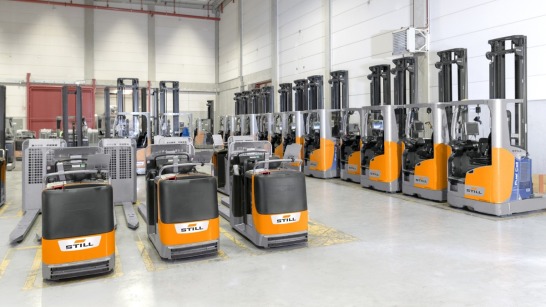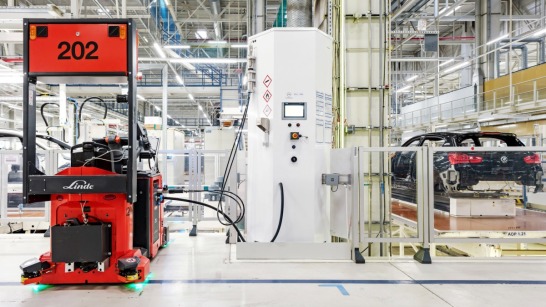In a 58,000-sq. meter (approximately 624,000 sq. feet) site, operated by French retail giant Carrefour, near the small French town of Vendin-le-Vieil, 137 trucks buzz around transporting goods, producing no emissions. The warehouse, which belongs to Europe’s second-largest retailer, was selected for a pilot project to trial the use of fuel cell technology on a large scale. In addition to STILL, project partners include US-based PlugPower, which specializes in hydrogen fuel cell systems, and Air Liquide, a French manufacturer of industrial gases.
The large-scale project illustrates the depth of expertise within the KION Group when it comes to fuel cells. STILL has been implementing hydrogen projects with a wide range of trucks since as far back as 2003. Linde Material Handling’s experience with fuel cell drives dates back even further, to 1997. The two brands are now pooling their expertise in KION Group’s New Energy Systems unit. “We have been investing a lot of time and effort into the fuel cell for a long time now,” explains Carsten Harnisch, a vice president of New Energy Systems at KION, adding, “It plays an important role in our energy concept, which allows us to respond to a wide range of customer requirements. In a tough 3-shift schedule, for example, customers need to maintain truck uptime at a very high level.”
Simple and practical, fast and clean
The ultra-rapid refueling process is one reason why the trucks have very little downtime. It takes just three minutes to top them back up at the stations installed specifically for this purpose. This was a particularly key benefit for Carrefour, which had relied on a fleet powered by lead-acid batteries. “The tedious task of changing a conventional lead-acid battery has now been eliminated,” notes Kevin Roche, who works as an order picker for the retailer. “It’s a much cleaner process too, even though previously the batteries were changed with the assistance of mechanized or semi-automatic systems.” Thus, the fuel cell trucks are also suitable for use in industries where hygiene is critical, such as pharmaceuticals or food.
The trucks’ green credentials offer an additional benefit. Hydrogen drives produce zero emissions during operation, which makes them ideal for use in closed warehouses. “After trialing the trucks for a little over a year, we now know that we can prevent around 30 metric tons of carbon dioxide from being released into the atmosphere every year,” says Alain Audegond, director of the Carrefour site in Vendin-le-Vieil. These savings are contingent on the hydrogen being derived from regenerative sources, such as biogas or electrolysis using solar or wind power. Hydrogen fuel cells also score highly in terms of environmental impact because they can be recycled and do not contain any toxic acids or pollutants. The comparatively long lifespan of fuel cells – around five years depending on use – also helps to reduce unnecessary waste in the long term.
“We are proud that we have successfully installed Europe’s largest fleet ever of hydrogen-powered industrial trucks,” says Björn Grünke, a product manager for Energy Systems at STILL. The size of the warehouse, the throughput of goods and the resulting quantity of industrial trucks that were needed made Carrefour the perfect candidate for the pilot project. Though fuel cell systems are economical even for fleets of 20 to 50 trucks, the effects are scalable, which means that the larger the fleet, the greater the savings. The use of hydrogen drives pays off even more in companies that use the gas in their production processes and already have a supply infrastructure in place.

_13x18_image_546x307.jpg)
